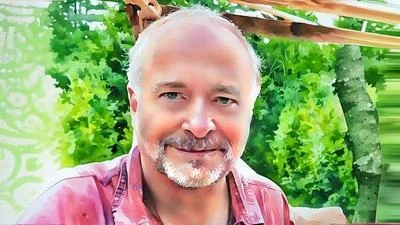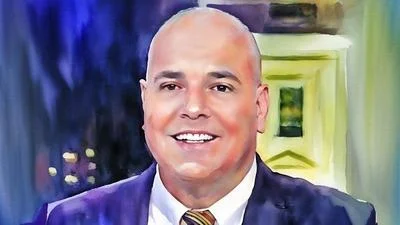Depending on who is asked, America’s policy toward Ukraine should be to stand for democracy or avoid an expensive entanglement with no clear end. Julian Hayda argues for continued U.S. support.
Hayda is associate director of public engagement at Razom for Ukraine. He brings personal conviction, cultural heritage, and firsthand experience to his work. A former radio journalist and a onetime Ukrainian Catholic seminarian in Kyiv, he is now based in Chicago with his wife and daughter.
As part of the largest pro-Ukraine nonprofit in the U.S., Hayda works to strengthen U.S.-Ukrainian relations and ensure that American policymakers understand the stakes of continued support. “We believe that it is in the fundamental American interest for Ukraine to be free and prosperous,” he says.
Razom—which means “together” in Ukrainian—serves as a bridge between U.S. and Ukrainian civil society, and was born out of the Euromaidan revolution over a decade ago. “Our idea is to make sure that those sacrifices... on the Maidan square in Kyiv... are not for naught,” Hayda says.
While Razom’s work is 90% humanitarian—supporting hospitals, mental health clinics, warehouses, and frontline aid—Hayda focuses on advocacy, making sure that American lawmakers receive accurate information. “We work on Ukraine policy, any sort of policy that touches on Ukraine,” he says.
Hayda believes geography explains much of Ukraine’s enduring importance. “Ukraine is incredibly wealthy in terms of resources,” he says, pointing to its unparalleled agricultural output and growing recognition of its mineral wealth. “It is in a very strategic and important place for the world and especially for the United States.”
This significance is both a blessing and a curse—drawing the interest and aggression of a Russian regime that, Hayda argues, is deeply insecure in its identity. “There’s such a deep identity crisis in Russia,” he says, and it manifests in hostility toward a self-assured Ukraine. “They can’t live without Ukraine; we can live without Russia.”
Even amid the brutality of war, Hayda insists Ukraine remains committed to peace. He calls the Vatican meeting between Trump and Zelensky a meaningful moment. “Every Ukrainian wants peace,” he says. “Ukrainians have been working towards peace while defending themselves.”
But when Putin offers temporary ceasefires, Hayda is skeptical. “Russia has violated every peace agreement for the last several decades,” he says, describing such moves as calculated propaganda to regroup, mislead, and manipulate. “They might stop shooting for a few days, but they’re already using these mind games.”
This is part of a wider Russian strategy to cast itself as the historic victor over fascism—what Hayda calls a dangerous myth. “World War II was fought over Ukraine... the human cost... was really borne by the people of Ukraine,” he says. And yet, Russia claims to be continuing the fight against fascism, even as it wages war on a democratic neighbor. “It is really disingenuous and really kind of intellectually dishonest.”
Economic interests are another central front. Ukraine’s rich stores of critical minerals have become a major opportunity for the U.S. to build strategic partnerships. “Ukrainians don’t want to take a turn towards China,” he says. Instead, “Ukrainians want to take a turn towards the United States.” If America fails to act, “Ukraine will take those resources elsewhere, and that would be very bad for both the strategic and economic interests of the United States.”
Despite global uncertainties and what Hayda describes as limited action from the Trump administration, he remains hopeful. “We’re seeing that Putin has been at this for 25 years and... believes the stakes are centuries deep,” he says. It’s not a conflict easily resolved. But he believes Americans should stand for the principle that “borders matter.”
Hayda’s own story is a kind of Ukrainian resilience. Wearing a traditional Ukrainian embroidered shirt, he recalls his great-grandmother telling him how she would have been imprisoned for such attire. “It is a form of resistance,” he says. His seminary education in Kyiv, conducted in Ukrainian, reflected a broader renaissance in national identity. “There’s been a real renaissance... of people speaking Ukrainian, wanting to identify as Ukrainian... because they understand that that is what sets them apart.”
Even within the Catholic Church, Hayda sees reason for hope. Pope Francis had strong historical ties to Ukraine, but Ukrainians have felt hurt by what they perceive as his efforts to placate Russia. Still, Hayda credits him for aiding Ukrainian causes and mediating for prisoners.
“He personally donated... and facilitated the release of Ukrainian Catholic priests.” During the conclave that just concluded, Hayda pointed out that a Ukrainian Catholic bishop, Mykola Bychok, was present “bringing up these moral and ethical and social issues.”
Hayda’s message is urgent: “Ukrainians want peace, and Ukrainians have fought for peace. And there is no moral ambiguity for standing up for what is right.”









